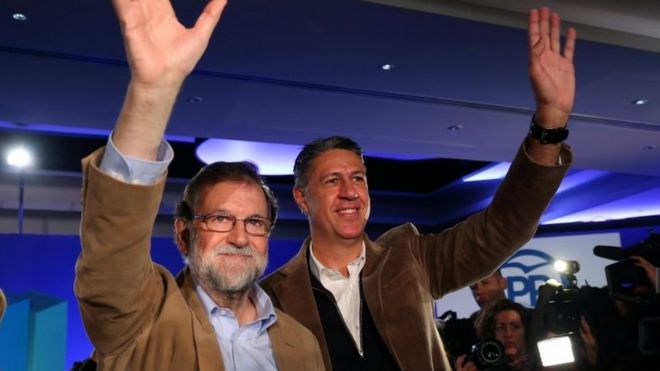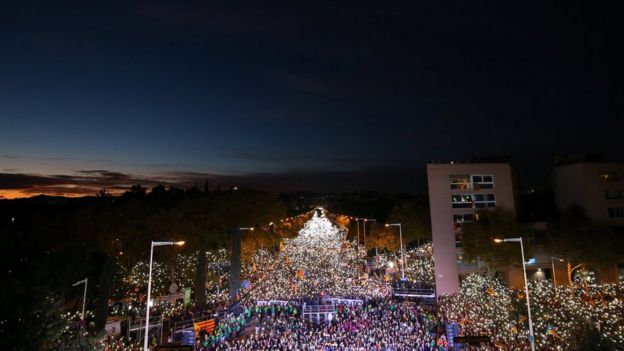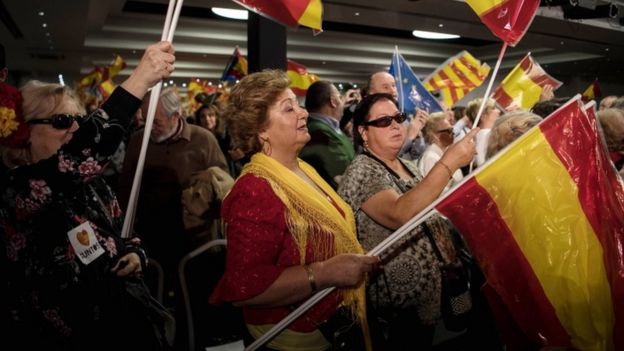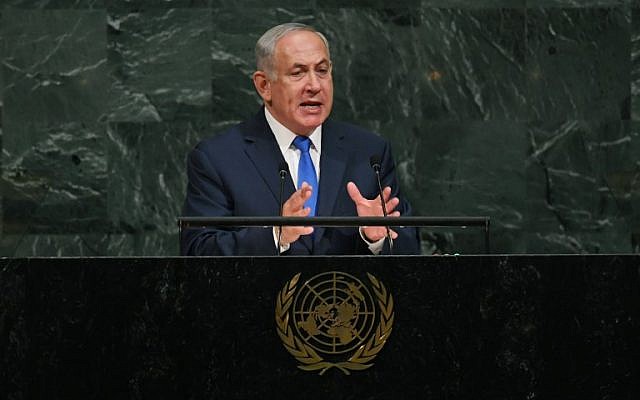Full text of Israeli Prime Minister Benjamin Netanyahu’s speech to the UN General Assembly, September 19, 2017:
Mr. President, ladies and gentlemen,We’re in the midst of a great revolution, a revolution in Israel’s standing among the nations. This is happening because so many countries around the world have finally woken up to what Israel can do for them. Those countries now recognize what brilliant investors like Warren Buffet and great companies like Google and Intel, what they’ve recognized and known for years: that Israel is the innovation nation — the place for cutting-edge technology in agriculture, in water, in cyber security, in medicine, in autonomous vehicles — you name it, we’ve got it.
Those countries now also recognize Israel’s exceptional capabilities in fighting terrorism. In recent years, Israel has provided intelligence that has prevented dozens of major terrorist attacks around the world. We have saved countless lives. You may not know this, but your governments do, and they are working closely together with Israel to keep your countries safe and your citizens safe.
I stood here last year on this podium and I spoke about this profound change in Israel’s standing in the world and just look at what has happened since, in one year: hundreds of presidents, prime ministers, foreign ministers and other leaders have visited Israel, many for the first time.
Of these many visits, two were truly historic. In May, President Trump became the first American president to include Israel in his first visit abroad. President Trump stood at the Western Wall, at the foot of the Temple Mount, where the Jewish people’s Temples stood for nearly a thousand years. When the president touched those ancient stones, he touched our hearts forever.
In July, Prime Minister Modi became the first Indian prime minister to visit Israel. You may have seen the pictures. We were on a beach in Hadera. We rode together in a jeep outfitted with a portable desalination device that some thriving Israeli entrepreneur invented. We took off our shoes, waded into the Mediterranean and drank seawater that had been purified only a few minutes earlier. We imagined the endless possibilities for Israel, India, for all humanity.
In the past year, Israel hosted so many world leaders, and I had the honor of representing my country on six different continents. One year. Six continents.
I went to Africa, where I saw Israeli innovators increasing crop yields, turning air into water, fighting AIDS.
I went to Asia, where we deepened our relations with China and with Singapore, and expanded our cooperation with our Muslim friends in Azerbaijan and Kazakhstan.
I went to Europe, where in London and Paris, Thessaloniki and Budapest, we enhanced our security and economic ties.
I went to Australia, becoming the first Israeli prime minister to visit our great allies Down Under.
And just last week, I went to South America, visiting Argentina and Colombia, and then I went on to Mexico, becoming, if you can believe it, the first Israeli prime minister ever to visit Latin America.
After 70 years, the world is embracing Israel, and Israel is embracing the world. One year. Six continents. Now, it’s true. I haven’t yet visited Antarctica, but one day I want to go there too because I’ve heard that penguins are also enthusiastic supporters of Israel. You laugh, but penguins have no difficulty recognizing that some things are black and white, are right and wrong.
Unfortunately, when it comes to UN decisions about Israel, that simple recognition is too often absent. It was absent last December when the Security Council passed an anti-Israel resolution that set back the cause of peace.
It was absent last May, when the World Health Organization adopted — you have to listen to this: the World Health Organization adopted a Syrian-sponsored resolution that criticized Israel for health conditions on the Golan Heights.
As the great John McEnroe would say, “You can-not be serious!” I mean, this is preposterous.
Syria has barrel-bombed, starved, gassed and murdered hundreds of thousands of its own citizens and wounded millions more, while Israel has provided lifesaving medical care to thousands of Syrian victims of that very same carnage. Yet who does the World Health Organization criticize? Israel.
So is there no limit to the UN’s absurdities when it comes to Israel?
Well, apparently not, because in July, UNESCO declared the Tomb of the Patriarchs in Hebron a Palestinian World Heritage site. That’s worse than fake news. That’s fake history. Mind you, it’s true that Abraham, the father of both Ishmael and Isaac, is buried there, but so too are Isaac, Jacob, Sarah, Rebecca – Sarah is a Jewish name, by the way – and Leah, who just happen to be patriarchs and matriarchs of the Jewish people. You won’t read about that in the latest UNESCO report.
But if you want to, you can read about that in a somewhat weightier publication — it’s called the Bible. I highly recommend it. I hear it even got 4 ½ out of 5 stars on Amazon. And it’s a great read. I read it every week.
Ladies and gentlemen, a moment to be serious: Despite the absurdities, despite the repetition of these farcical events, there is change. Slowly but surely, there are signs of positive change, even at the United Nations.
Mr. Secretary General, I very much appreciate your statement that denying Israel’s right to exist is anti-Semitism, pure and simple. Now, that’s important, because for too long the epicenter of global anti-Semitism has been right here at the UN. And while it may take many years, I am absolutely confident that the revolution in Israel’s ties with individual nations will ultimately be reflected in this hall of nations. I say that because there is also a marked change in the position of some of our key friends.
Thanks to President Trump’s unequivocal support for Israel in this body, that positive change is gathering force. So, thank you, President Trump. Thank you for supporting Israel at the UN. And thank you for your support, Ambassador Nikki Haley. Thank you for speaking the truth about Israel.
But, ladies and gentlemen, here at the UN, we must also speak the truth about Iran, as President Trump did so powerfully this morning. Now, you know I’ve been ambassador to the UN and I’m a long-serving Israeli prime minister, so I’ve listened to countless speeches in this hall, but I can say this: none were bolder, none more courageous and forthright than the one delivered by President Trump today.
President Trump rightly called the nuclear deal with Iran, he called it an embarrassment. Well, I couldn’t agree with him more. And here’s why: Iran vows to destroy my country every day, including by its chief of staff the other day. Iran is conducting a campaign of conquest across the Middle East and Iran is developing ballistic missiles to threaten the entire world.
Two years ago, I stood here and explained why the Iranian nuclear deal not only doesn’t block Iran’s path to the bomb, Iran’s nuclear program has what’s called a sunset clause. Let me explain what that term means: It means that in a few years, those restrictions will be automatically removed — not by a change in Iran’s behavior, not by a lessening of its terror or its aggression. They’ll just be removed by a mere change in the calendar. And I warned that when that sunset comes, a dark shadow will be cast over the entire Middle East and the world, because Iran will then be free to enrich uranium on an industrial scale, placing it on the threshold of a massive arsenal of nuclear weapons.
That’s why I said two years ago that the greater danger is not that Iran will rush to a single bomb by breaking the deal, but that Iran will be able to build many bombs by keeping the deal.
Now, in the last few months, we’ve all seen how dangerous even a few nuclear weapons can be in the hands of a small rogue regime.
Now imagine the danger of hundreds of nuclear weapons in the hands of a vast Iranian Islamist empire, with the missiles to deliver them anywhere on earth.
I know there are those who still defend the dangerous deal with Iran, arguing that it will block Iran’s path to the bomb.
Ladies and gentlemen, That’s exactly what they said about the nuclear deal with North Korea, and we all know how that turned out. Unfortunately, if nothing changes, this deal will turn out exactly the same way.
That’s why Israel’s policy regarding the nuclear deal with Iran is very simple: Change it or cancel it, fix it or nix it. Nixing the deal means restoring massive pressure on Iran, including crippling sanctions, until Iran fully dismantles its nuclear weapons capability. Fixing the deal requires many things, among them inspecting military and any other site that is suspect, and penalizing Iran for every violation. But above all, fixing the deal means getting rid of the sunset clause.
And beyond fixing this bad deal, we must also stop Iran’s development of ballistic missiles and roll back its growing aggression in the region. I remember we had these debates. As you know, I took a fairly active role in them. And many supporters of the nuclear deal naively believed that it would moderate Iran. It would make it a responsible member, so they said, of the international community.
Well as you know, I strongly disagreed. I warned that when the sanctions on Iran would be removed, Iran would behave like a hungry tiger unleashed, not joining the community of nations, but devouring nations, one after the other. And that’s precisely what Iran is doing today.
From the Caspian Sea to the Mediterranean, from Tehran to Tartus, an Iranian curtain is descending across the Middle East. Iran spreads this curtain of tyranny and terror over Iraq, Syria, Lebanon and elsewhere, and it pledges to extinguish the light of Israel.
Today, I have a simple message for Ayatollah Khamenei, the dictator of Iran: The light of Israel will never be extinguished.
Those who threaten us with annihilation put themselves in mortal peril. Israel will defend itself with the full force of our arms and the full power of our convictions. We will act to prevent Iran from establishing permanent military bases in Syria for its air, sea and ground forces. We will act to prevent Iran from producing deadly weapons in Syria or in Lebanon for use against us.
And we will act to prevent Iran from opening new terror fronts against Israel along our northern border.
As long as Iran’s regime seeks the destruction of Israel, Iran will face no fiercer enemy than Israel.
But I also have a message today for the people of Iran: You are not our enemy; you are our friends. Shomaah doosteh mah hasteed [You are our friends]. One day, my Iranian friends, you will be free from the evil regime that terrorizes you, hangs gays, jails journalists, tortures political prisoners, and shoots innocent women like Neda Sultan, leaving her choking on her own blood on the streets of Tehran. I have not forgotten Neda. I am sure you haven’t too.
And when that day of liberation finally comes, the friendship between our two ancient peoples will surely flourish once again.
Ladies and gentlemen, Israel knows that in confronting the Iranian regime, we are not alone. We stand shoulder to shoulder with those in the Arab world who share our hopes for a brighter future.
We’ve made peace with Jordan and Egypt, whose courageous President Abdel-Fattah el-Sissi I met here last night. I appreciate President el-Sissi’s support for peace, and I hope to work closely with him and other leaders in the region to advance peace.
Israel is committed to achieving peace with all our Arab neighbors, including the Palestinians. Yesterday, President Trump and I discussed this, all of this, at great length. I appreciate President Trump’s leadership, his commitment to stand by Israel’s side, his commitment to advance a peaceful future for all. Together, we can seize the opportunities for peace and together we can confront the great dangers of Iran.
The remarkable alliance between the United States and Israel has never been stronger, never been deeper. Israel is deeply grateful for the support of the Trump administration, the American Congress and the American people.
Ladies and gentlemen, in this year of historic visits and historic anniversaries, Israel has so much to be grateful for. A hundred and twenty years ago, Theodor Herzl convened the First Zionist Congress to transform our tragic past into a brilliant future by establishing the Jewish state. One hundred years ago, the Balfour Declaration advanced Herzl’s vision by recognizing the right of the Jewish people to a national home in our ancestral homeland. Seventy years ago, the United Nations further advanced that vision by adopting a resolution supporting the establishment of a Jewish state. And 50 years ago, we reunited our eternal capital Jerusalem, achieving a miraculous victory against those who sought to destroy our state. Theodor Herzl was our modern Moses — and his dream has come true. We’ve returned to the Promised Land, revived our language, in-gathered our exiles and built a modern, thriving democracy.
Tomorrow evening, Jews around the world will celebrate Rosh Hashanah, the beginning of our new year. It’s a time of reflection, and we look back with wonder at the miraculous rebirth of our nation, and we look ahead with pride to the remarkable contributions Israel will continue to make to all nations.
You look around you and you will see those contributions every day — in the food you eat, the water you drink, the medicines you take, the cars you drive, the cell phones you use, and in so many other ways that are transforming our world.
You see it in the smile of an African mother in a remote village, who, thanks to an Israeli innovation, no longer must walk eight hours a day to bring water to her children.
You see it in the eyes of an Arab child, who was flown to Israel to undergo a life-saving heart operation.
And you see it in the faces of the people in earthquake-stricken Haiti and Nepal who were rescued from the rubble and given new life by Israeli doctors.
As the prophet Isaiah said, “I have made you a light unto the nations, bringing salvation to the ends of the earth.”
Today, 2,700 years after Isaiah spoke those prophetic words, Israel is becoming a rising power among the nations. And at long last, its light is shining across the continents, bringing hope and salvation to the ends of the earth.
Happy New Year, Shanah Tovah from Israel. Thank you







